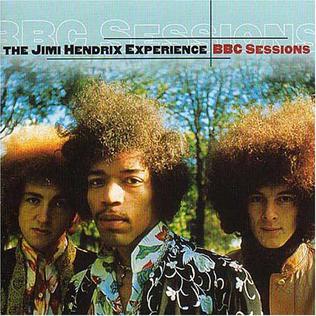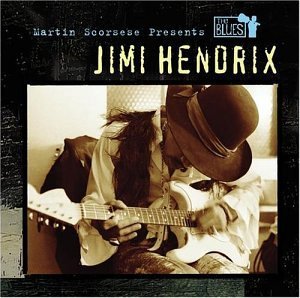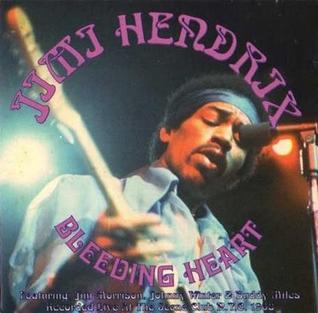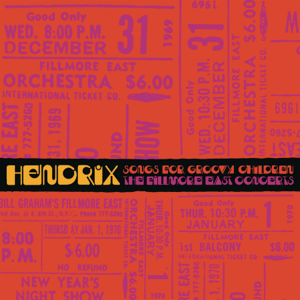
Electric Ladyland is the third and final studio album by the Jimi Hendrix Experience, released in October 1968. A double album, it was the only record from the Experience with production solely credited to Hendrix. The band's most commercially successful release and its only number one album, it was released by Reprise Records in the United States on October 16, 1968, and by Track Records in the UK nine days later. By mid-November, it had reached number 1 on the Billboard Top LPs chart, spending two weeks there. In the UK it peaked at number 6, where it spent 12 weeks on the British charts.

Band of Gypsys is a live album by Jimi Hendrix and the first without his original group, the Jimi Hendrix Experience. It was recorded on January 1, 1970, at the Fillmore East in New York City with Billy Cox on bass and Buddy Miles on drums, frequently referred to as the Band of Gypsys. The album mixes funk and rhythm and blues elements with hard rock and jamming, an approach which later became the basis of funk rock. It contains previously unreleased songs and was the last full-length Hendrix album released before his death six months later.

First Rays of the New Rising Sun is a compilation album credited to American rock musician Jimi Hendrix, issued in April 1997 on MCA Records. Featuring songs mostly intended for his planned fourth studio album, it was one of the first releases overseen by Experience Hendrix, the family company that took over management of his recording legacy. It reached the album charts in the United States, United Kingdom, and four other countries.
"Red House" is a song written by Jimi Hendrix and one of the first songs recorded in 1966 by the Jimi Hendrix Experience. It has the musical form of a conventional twelve-bar blues and features Hendrix's guitar playing. He developed the song prior to forming the Experience and was inspired by earlier blues songs.

BBC Sessions is an album of recordings by the rock group the Jimi Hendrix Experience, released on MCA Records on June 2, 1998. It contains all the surviving tracks from their various appearances on BBC radio programmes, such as Saturday Club and Top Gear, recorded in 1967.
"Voodoo Chile" is a song written by Jimi Hendrix and recorded in 1968 for the third Jimi Hendrix Experience album Electric Ladyland. It is based on the Muddy Waters blues song "Rollin' Stone", but with original lyrics and music. At 15 minutes, it is Hendrix's longest studio recording and features additional musicians in what has been described as a studio jam.

"Voodoo Child (Slight Return)" is a song written by Jimi Hendrix and recorded by the Jimi Hendrix Experience in 1968 that appears as the final track on the groups's third studio album, Electric Ladyland, released that year. It contains improvised guitar and a vocal from Hendrix, backed by Noel Redding on bass and Mitch Mitchell on drums. The song is one of Hendrix's best known; it was a feature of his concert performances throughout his career, and several live renditions were recorded and released on later albums.

The Jimi Hendrix Experience is a box set by the British-American rock band the Jimi Hendrix Experience, released in 2000 by MCA. The material includes alternative recordings, live performances and some rarities. Although most of the material had been released in earlier compilations, some previously unreleased material was also included.

Martin Scorsese Presents the Blues: Jimi Hendrix is a ten track companion release to the critically acclaimed television documentary series Martin Scorsese Presents The Blues shown on PBS in September 2003.

"Rollin' Stone" is a blues song recorded by Muddy Waters in 1950. It is his interpretation of "Catfish Blues", a Delta blues that dates back to 1920s Mississippi. "Still a Fool", recorded by Muddy Waters a year later using the same arrangement and melody, reached number nine on the Billboard R&B chart. "Rollin' Stone" has been recorded by a variety of artists.

Bleeding Heart is one of several names given to albums of a 1968 jam session with Jimi Hendrix, Jim Morrison, and others. The albums were fashioned from an informal two-track tape recording made by Hendrix which was subsequently stolen from his apartment. The jam took place at the Scene, a nightclub in New York City, and various dates and participants have been suggested. Although it presents a unique setting, critics and biographers have generally found fault with the sound quality and Morrison's performance.

Rainbow Bridge is a compilation album by American rock musician Jimi Hendrix. It was the second posthumous album release by his official record company and is mostly composed of recordings Hendrix made in 1969 and 1970 after the breakup of the Jimi Hendrix Experience. Despite the cover photo and subtitle Original Motion Picture Sound Track, it does not contain any songs recorded during his concert appearance for the 1971 film Rainbow Bridge.
"Stepping Stone" is a song by American musician Jimi Hendrix. Written and produced by Hendrix, he recorded it early in 1970 with the short-lived Band of Gypsys lineup of Hendrix, Billy Cox and Buddy Miles. The song, with "Izabella", was released as a single by Reprise Records on April 8, 1970. It was the last single released by Hendrix before his death. Other versions are included on posthumous albums.

Live at the Oakland Coliseum is a two-disc posthumous live album by the Jimi Hendrix Experience. It documents the group's performance at the Oakland Coliseum in Oakland, California, on April 27, 1969. The Experience broke up two months later, making the album one of the last full-length concert recordings of the trio to be officially issued.

The Cry of Love Tour was a 1970 concert tour by American rock guitarist and singer Jimi Hendrix. It began on April 25, 1970, at the Forum in Inglewood, California, and ended on September 6, 1970, at the Love & Peace Festival in Fehmarn, West Germany. The majority of the 37 shows were in the United States, with two each in Sweden, Denmark, and West Germany, and one in England, where Hendrix was the final act at the Isle of Wight Festival 1970.

"Bleeding Heart" is a song written and recorded by American blues musician Elmore James in 1961. Considered "among the greatest of James' songs", "Bleeding Heart" was later popularized by Jimi Hendrix, who recorded several versions of the song.

"Hear My Train A Comin'" is a blues-based song written by Jimi Hendrix. Lyrically, it was inspired by earlier American spirituals and blues songs which use a train metaphor to represent salvation. Hendrix recorded the song in live, studio, and impromptu settings several times between 1967 and 1970, but never completed it to his satisfaction.
American guitarist Jimi Hendrix intended to release his fourth studio album as a double or triple LP before Christmas 1970. From June to August 1970, he made good progress on the realization of the planned album in his new Electric Lady Studios. Many songs were mixed on 20, 22 and 24 August. Four of these mixes were regarded as definitive versions and were presented at the opening party of Electric Lady on 26 August. Hendrix died on 18 September that year, leaving behind an enormous number of unreleased recordings in various stages of completion. It is impossible to know what Hendrix would have changed and what he actually would have released, but there is some documentation of the album configurations he had in mind. While a good amount of the designated tracks only needed some finishing touches, others only existed as rough recordings, and for some titles no recordings are known to exist. The Cry of Love (1971), Voodoo Soup (1995) and First Rays of the New Rising Sun (1997) are officially released attempts to reconstruct the planned album. First Rays of the New Rising Sun is usually regarded as closest to Hendrix's vision, but features a track that was probably never part of Hendrix's plans and omits some tracks that were definitely considered. All but one of the tracks that are known to have been recorded for the album have eventually been released in some form on official albums.

Songs For Groovy Children: The Fillmore East Concerts is a chronologically sequenced collection of American musician Jimi Hendrix's 1969–1970 New Years recorded performances at the Fillmore East in New York City. It was released as a box set of five-CDs on November 22, 2019 and an eight-LP set on December 13.
















